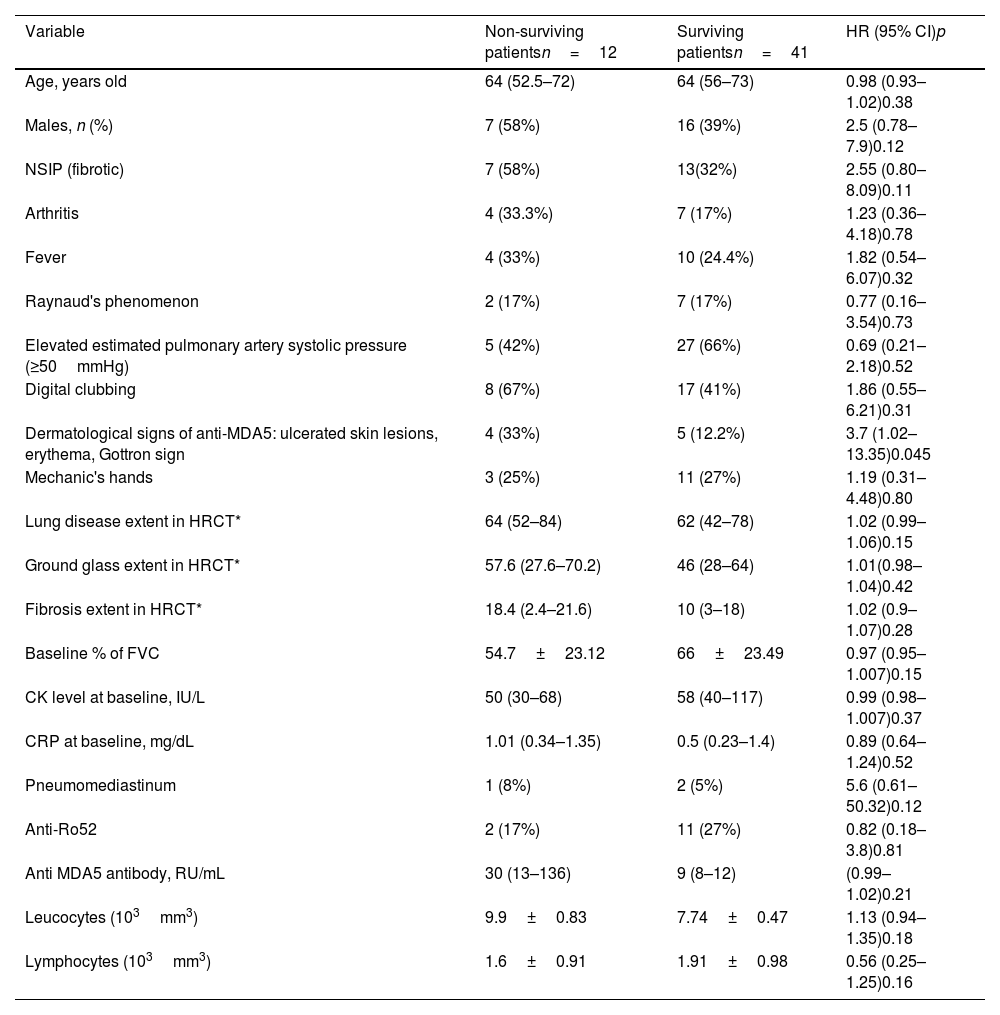The anti-MDA5-associated autoimmune disease represents a poorly understood entity. The study's objectives were to describe a cohort of interstitial lung disease (ILD) patients who were positive for anti-MDA5 autoantibody and identify clinical risk factors associated with survival.
MethodsThis single-center cohort study included ILD patients positive for anti-MDA5 autoantibody. Baseline clinical features were registered, and survival analysis was performed to identify risk factors associated with worse survival.
ResultsFifty-three ILD-MDA5 positive patients were included; twelve died during follow-up due to rapidly progressive interstitial lung disease (RP-ILD). Dermatological signs of anti-MDA5 (Gottron papules, Gottron sign, palmar papules, V-neck sign, facial dermatomyositis rashes, and skin ulcers) were strongly associated with death secondary to RP-ILD (HR: 3.7, 95% CI: 1.02–13.35). Patients with dermatological signs were younger, had higher anti-MDA5 autoantibodies titers, more frequent inflammatory patterns in HRCT evaluation, and less fibrosis extent in HRCT.
ConclusionDermatological manifestation in ILD patients to anti-MDA5 autoantibodies are associated with RP-ILD and short-term fatal outcomes. Dermatological signs may identify a subgroup of ILD-positive to anti-MDA5 patients with a high risk of RP-ILD.
La enfermedad autoinmune asociada a los anticuerpos anti-MDA5 es una entidad poco estudiada. Los objetivos de este estudio son describir una cohorte de sujetos con enfermedad pulmonar intersticial (EPI) positivos al anticuerpo anti-MDA5 e identificar los factores clínicos de riesgo asociados con la supervivencia.
MétodosEstudio de cohorte de un solo centro de pacientes con EPI y positivos al anticuerpo anti-MDA5. Se registraron las características clínicas basales y se realizó un análisis de supervivencia para identificar los factores de riesgo asociados con la supervivencia.
ResultadosSe incluyeron 53 pacientes con EPI y positivos a anti-MDA5; 12 pacientes fallecieron por una enfermedad intersticial rápidamente progresiva (EPI-RP). Los signos dermatológicos asociados a anti-MDA5 (pápulas de Gottron, signo de Gottron, pápulas palmares, signo de la V del escote, eritema facial de dermatomiositis y úlceras cutáneas) se asociaron fuertemente con la EPI-RP (HR: 3,7, IC 95%: 1,02-13,35). Los pacientes con manifestaciones dermatológicas eran más jóvenes, tenían mayores títulos de anticuerpos anti-MDA5, tenían mayor frecuencia de patrones inflamatorios en la tomografía de tórax de alta resolución y menor extensión de la fibrosis en la TCAR.
ConclusiónLas manifestaciones dermatológicas en los pacientes con EPI positivos a anticuerpos anti-MDA5 están asociados a EPI-RP y a desenlaces fatales al corto plazo. Los signos dermatológicos pueden identificar un subgrupo de pacientes positivos a anti-MDA5 con mayor riesgo de EPI-RP.












